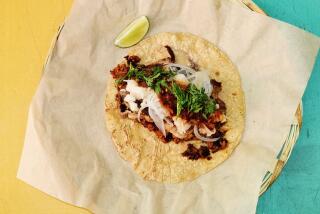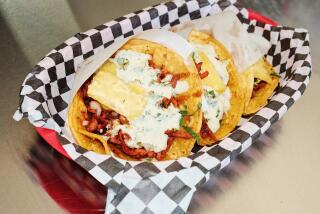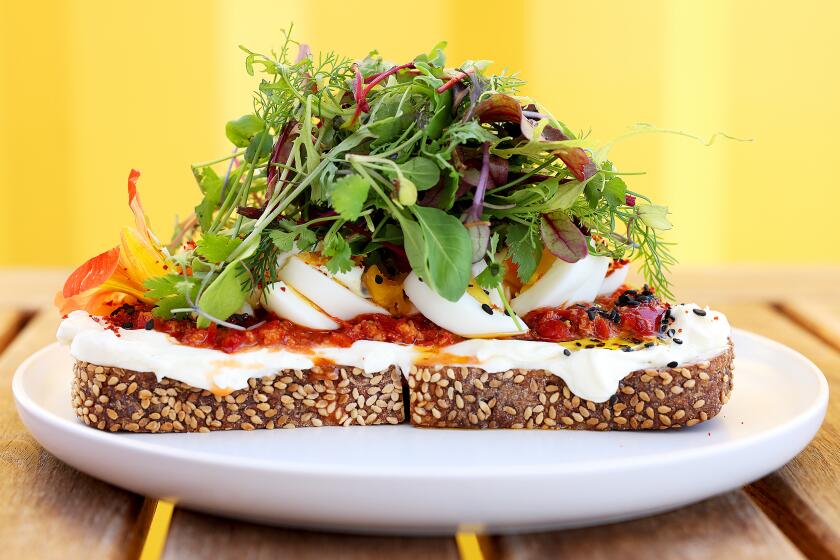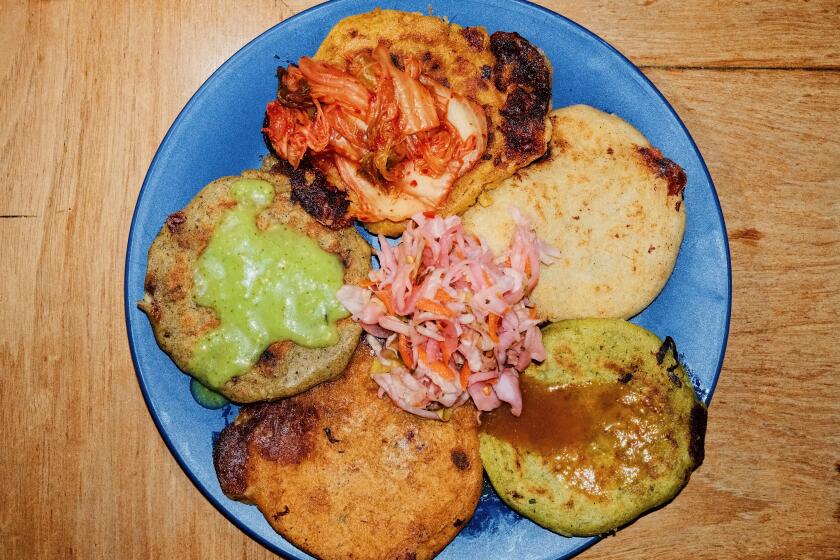Tortillas gaining ground in battle for bread aisle
The food they sell may be flat, though Herman Jacobs and his son Brian say that sales are anything but.
The two own Santa Monica-based Tumaro’s Gourmet Tortillas, which sells flavored varieties of the ancient staple to retailers and restaurants in the United States and around the world. In 11 years of business, the Jacobs watched as diners went through the low-carb craze, the wrap craze and the grains craze, each driving tortilla sales higher and higher.
“People are using tortillas for more and more applications,” said Brian Jacobs, 41. “We’re really gaining momentum.”
As eating nutritious food on the go catches on across the country, tortillas are more popular than ever. With sales estimated at more than $4 billion a year, the tortilla is fast approaching white bread as the filling holder of choice.
A growing Latino population and the popularity of grab-and-go foods have contributed to the tortilla’s rise. A 2002 study by the Tortilla Industry Assn. found tortillas holding about a third of the U.S. bread market, slightly behind white bread’s slice of the industry.
“Competing with white bread is really kind of a big deal,” said Roberto Quinones, executive director of the group, which moved in January from Dallas to Washington-adjacent McLean, Va., with plans for becoming “more professional.”
Tumaro’s gobbled up its corner of the industry by developing offbeat flavors for a food that usually comes in just two varieties, corn or flour. The Jacobses have tried flavors such as spinach, Indian curry, pineapple banana and Caesar salad for their tortillas.
“American consumers are flavor junkies. They like their options,” said Bill Briwa, chef instructor at the Culinary Institute of America in St. Helena, Calif.
He said an interest in global cuisine had increased the popularity of burritos, quesadillas and flatbread. People are tired of sandwiches, Briwa said, and see wraps as more exotic.
Tumaro’s sells 180 million tortillas a year to 21,000 supermarkets across the country, as well as to universities and restaurants. The company’s annual sales range from $10 million to $30 million. Its honey wheat and multigrain offerings were voted “best tortilla” in the U.S. by Men’s Health magazine in 2003 and its products garnered “best wrap” honors from Health magazine in 2006.
The company also sells to the United Arab Emirates and will begin exporting to Mexico in January.
“It’s like selling bagels to Israel,” said Herman Jacobs, 71, who was previously known for helping build Hain Pure Foods with his brother Jerald.
The brothers increased sales at the natural food giant that their father, George, bought from Harold Hain in 1953. Sales increased from $100,000 that year to $45 million in 1982. But after Jerald died of a brain tumor in 1980, Herman said he sold the business because he didn’t have the heart to continue.
After retiring, Jacobs began to get bored. In 1995, he decided to buy a small frozen burrito company to introduce his sons Brian and Jason, who is no longer involved in Tumaro’s, to running a business.
When they tasted a few of their frozen burritos, they noticed that the tortillas were often cracked, dry and had an acidic taste. They decided to make their own, first adding honey to the recipe and then branching out into different flavors.
They make their tortillas low in fat and kosher, with organic ingredients to cater to health-conscious consumers. The company says its tortillas are free of trans fats, and its low-carb multigrain tortillas offer another option for those used to corn tortillas.
But initially no one was buying.
“We had a lot of rejection in the beginning,” Herman Jacobs said. “People liked the concept, but it didn’t really sink in.”
They started pitching to grocery stores in the region. In 1997, Vons gave Tumaro’s a three-month trial. Herman Jacobs would hover near the tortilla displays, watching to see if anyone was buying.
Customers liked the tortillas, even though they were more expensive than traditional versions. Sales boomed when the company marketed its tortillas as more versatile and nutritious than traditional ones.
“People kept seeing tortillas as Mexican food,” Brian Jacobs said. “We saw it more as a bread replacement.”
There’s also a convenience factor: Things can be wrapped up in tortillas and eaten on the run. That’s what attracted Kipp Dougherty, director of dining services at UC Riverside. The university buys about 8,000 tortillas a year from Tumaro’s.
“We’ve put just about everything you can think of in a wrap,” she said. “When you’re in a university environment, everything is grab and go.”
In their tortilla factory in Monterey Park, Brian and Herman Jacobs take a visitor past the vats where the many flavors of dough are mixed and the conveyor belt on which the globs are squashed flat, baked and stuffed into bags. The air is tomato-scented -- the factory is producing sun-dried tomato tortillas -- and the Jacobses show off the bright packaging that emphasizes the nutritious aspects of their product.
But most of all, they seem relieved that Americans are still embracing health food -- a concept that Herman’s father pushed through Hain Pure Foods half a century ago. Without interest in health food, it’s unlikely that customers would spend more for gourmet tortillas.
“No matter how good you are,” Herman said, “you gotta be lucky.”
*
More to Read
Eat your way across L.A.
Get our weekly Tasting Notes newsletter for reviews, news and more.
You may occasionally receive promotional content from the Los Angeles Times.











